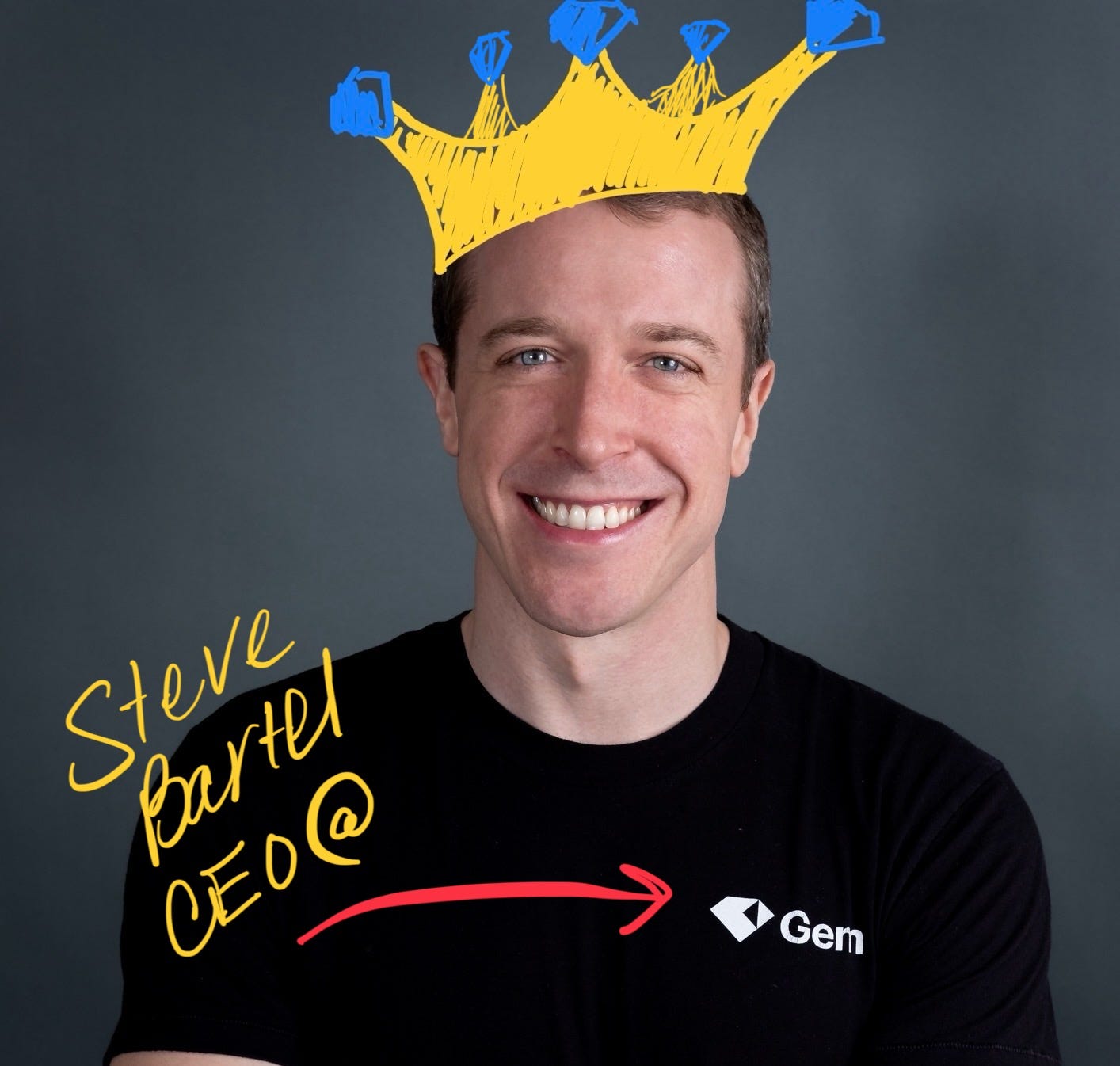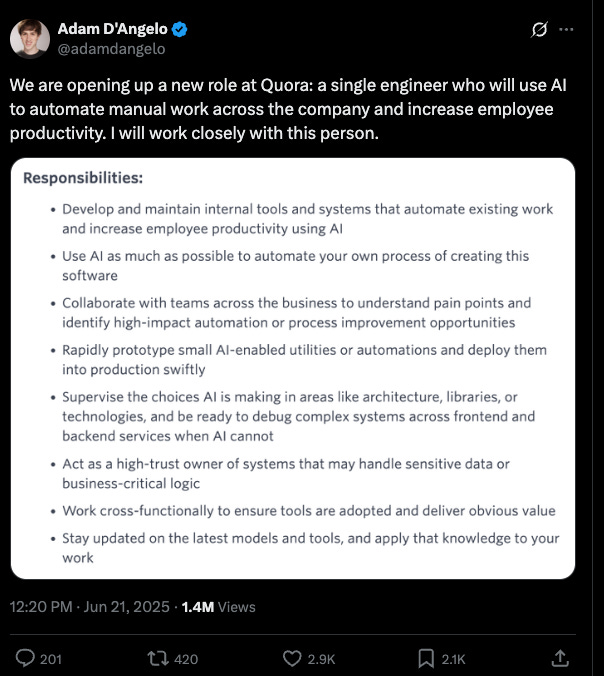Gem's CEO basically said "nah, you can still shoot your shot even tho we closed applications" 💀
Hot recruiting goss from a unicorn founder who lives and breathes the job market
Good morning from the depths of hell. Is anyone not under a heat advisory this week?
But the job search doesn’t stop for the weather, and neither do I. This week’s newsletter has lots of juicy job searching tips from Gem co-founder and CEO Steve Bartel, plus remote cybersecurity jobs and a new unicorn sighting (almost).
Goodspeed (and A/C) to all of you.
-Jordan
Company spotlight: Gem
Gem is an AI-powered all-in-one recruiting platform with clients like DoorDash, Asana, Figma, and Robinhood … and also GitLab and Snap. Oh, and Anthropic. NBD. (They are hiring, btw.)
The co-founder and CEO, Steve Bartel, is an MIT grad and a DropBox alum who started Gem in 2017 and unicorned in 2021. He also writes startuphiring101.com. So he knows a lot about hiring. Like, a lot more than most. A lot a lot.
He’s also a really kind and generous guy, which makes it all the more strange that he insisted on being pictured here wearing his crown of gems.
Anyway, Steve spilled the tea on how they made the best hires in Gem’s early stages, and he let me in on why some job postings seem to vanish as soon as they appear.
What made a really good hire during Gem’s earliest stages?
We were definitely optimizing for and seeing a lot of success with generalists, folks that could wear a lot of different hats. So engineering, for example. The way we hired at Gem was very different from the profile we looked for at a place like Dropbox, where I had the first five years of my career where we were looking for specialists, people that could help scale infrastructure for hundreds of millions of users.
But for Gem—and I think this is true of a lot of early-stage startups—the biggest challenge is how do you build a great product that people want versus the hard infrastructure challenges?
Even with this whole AI revolution, a lot of the AI pieces, the underlying algorithm, you don’t necessarily need specialists to pull that off anymore. For Gem, we were served really well by looking for generalists, people who wanted to work full-stack. People who, instead of working on the hardest infrastructure problems, would get fired up about talking to customers and about the business impact of building things that people actually want.
Tell me about the candidates you hired for the long haul.
Somebody who’s always learning and growing, but sometimes that’s hard to evaluate for. I like to look for whether somebody’s learning, whether they’re taking on things outside of their immediate role to get better at their craft or to learn about other things and have a bigger impact.
I like somebody who can learn from the mistakes they’ve made. A really big part of having a growth mindset is being able to be introspective and do retros on decisions that were made and so that you can do better next time.
That’s probably the biggest thing for if somebody can scale with a company for a long time, because so often the role that you hire somebody for, especially at a startup, it changes really quickly. As you scale from 10 people to 50 people to 100 people to 300 people, the company is changing every 18 months to the point that your role is changing too.
As a founder and CEO, and as someone who just looks at the job market all the time, what’s your best advice for standing out?
Companies have fewer roles open than they used to, and on top of that, recruiting teams are just drowning in work. Recruiters simply don’t have enough time to even review every single application that comes in.
For opportunities that candidates really want to nail, find ways to network into that company.
The unfortunate reality is that 20% of our customers see thousands of applicants for a single role. It’s pretty important to make sure you’re qualified for the role if you want to get a look. Companies don’t have the luxury of interviewing as many people as they used to.
Then he paused, his eyes twinkled, and Steve offered one more juicy bit of advice …
But if there’s a dream role you saw one day and then you see it taken down the next, don’t necessarily assume that that role is filled.
What’s happening is that companies are posting a role, they see hundreds of applicants, and then they take the role down because they’re overwhelmed. A lot of times, they’re just trying to process those 300 or 500 applicants that they got over a weekend. It doesn’t necessarily mean that you don't have a shot.
If you’re a good fit for a role, if it’s your dream role, go the extra mile to try to network to get an intro, even if that role might have been taken down. It might still be two months before they actually close that role.
Open jobs
Let’s get down to business, baby. Here’s a bushel of open jobs just dying for your attention.
Northwood describe themselves as “a new kind of ground network for a new kind of space economy” and “a data highway between earth and space.” I describe that as “holy shit that’s amazing.” Think networks for GPS and climate monitoring and missile warnings and broadband. These buncha overachievers are hiring for jobs in Los Angeles.
Remote job alert! Pulley is looking for remote engineers, product managers, and an ops VP. They’re a cap table and equity management startup for founders. Very meta. (Philosophy meta, not Zuckerberg Meta.)
More remote jobs! Cybersecurity startup ClearVector is looking for remote software engineers and a researcher. Huzzah!
Digital business card company Blinq is hiring for positions in Melbourne and Sydney, Australia, and in SF here in the states. They already boast clients like Mckinsey, LVMH, Disney, Nike, and Atlassian. And they just announced a $25 million series A this month!
Lots to choose from at Phasecraft, the quantum algorithms company. Phasecraft is working with the UK government to “develop quantum computing solutions for optimization problems within energy grids” and with a university to “explore the capabilities of quantum computing for developing new drugs for myotonic dystrophy.” Say that 10 times fast. Phasecraft hiring for tech roles in Bristol and London in the UK and in Washington DC.
David AI develops audio datasets for conversational AI. They announced a $5 million seed in January, then busted out with a $25 million Series A in May. They’re hiring for engineers, data operations, and research in SF.
I know the last thing you think you need right now is more sweat, but you’re wrong! SweatPals lets users create, manage, and monetize fitness events. It’s a social marketplace for sporty types. They’re hiring in several U.S. cities and they’re recruiting a remote head of engineering in the EU.
Here’s something unique: The Allied Network for Neurodevelopmental Advancement, or ANNA, is hiring a founding engineer to build and scale the AI-powered platform that is the foundation for their autism care delivery. It’s a small organization with a deserving mission: to provide high-quality, evidence-based services for autistic children and their families. ANNA announced $9 million in funding in November.
This last job isn’t at a startup, but I think it’s interesting enough to make the cut. Adam D’Angelo, cofounder of Quora (board member of OpenAI, original CTO of facebook, first check into Instagram… etc…) posted this a few days ago:
Required reading
🦄 TechCrunch reports a possible sighting of an almost solo unicorn in Maor Shlomo, who sold his eight-employee company Base44 to Wix this week for $80 million in cold hard 💵.
Adam DeRose over at HR Brew reports that employers are now prioritizing “skill velocity over skill depth” in AI when it comes to job applicants. Meaning that it’s not so much how much you know about AI, it’s how fast you can learn the newest thang.
Sahil over at Venture Curator details how to fight burnout while working in startups—before it takes you down. ❤️🔥
👨🏻💻 As the temperature heats up, and so does the competition for the best tech jobs, I couldn’t help but wonder… What else can I be doing for my fine readers?
Tell me using the comment button.
PS: When you apply to the a16z talent network, real humans actually look at what you send us, then we match you to hiring startups.
And next time: We live in a physical world, so who’s making great physical products? The next newsletter will feature companies that make things. Like, real shit (no, not that kind) you can put your hands on.





